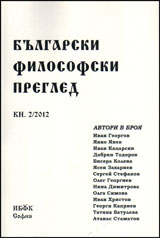Опит върху методологията на историята на средновековната естетика
An Essay on Methodology of History of Medieval Aesthetics
Author(s): Sergey StefanovSubject(s): Philosophy
Published by: Институт за българска философска култура
Summary/Abstract: The paper represents an attempt at approving of relevant historical-philosophical analysis of medieval views of sensuousness, sensitive beauty, the nature of art and its presence within some of the philosophical theories and the mentality of medieval Europe. The debate about medieval aesthetics is highly controversial in the first place because of fact that every speaking of aesthetics “of” Medieval Ages is anachronistic. Within the framework of medieval philosophy there isn’t any autonomous theoretical field conceptualizing the “problems of aesthetics”: the aesthetics as philosophical discipline is a project of Modernity. There are two main approaches to dealing with the problem of medieval aesthetics: the first one examines it in the terms of modern aesthetics, and mostly in the terms of Kantian philosophy; the second one uses the method of philosophical hermeneutics in attempt to reconstruct the authentic “aesthetic views” of the people of the Middle Ages. The hermeneutic method is a direct critique of the attempts of modern aesthetics to apply its concepts to the “prae-aesthetic” periods, such as the medieval: that point of view is considered to be a “meta-historical” one. At the same time, the hermeneutic method “aestheticizes” the medieval culture (Sergei Averintsev, Umberto Eco) or, contrary, denies the presence of “aesthetic elements” within the medieval philosophical theories, because of their predominantly theological and metaphysical focus (Andreas Speer). The purpose of this text is to defend a relevant method, which can be used for making of history of medieval aesthetics. The method has two different aspects: the genealogical analysis of the conceptions, which are not aesthetic in the proper sense, but which are speculative and semantically related to the formation of the aesthetic theories in the European intellectual culture; and finally the approach of “l'histoire des valeurs” (Jacques Le Goff), which pretends to indicate the changes in the mentality and which is directly linked with the attitudes of sensuousness and the perceptions of beauty in medieval culture.
Journal: Български философски преглед
- Issue Year: 2012
- Issue No: 2
- Page Range: 123-135
- Page Count: 13
- Language: Bulgarian
- Content File-PDF

